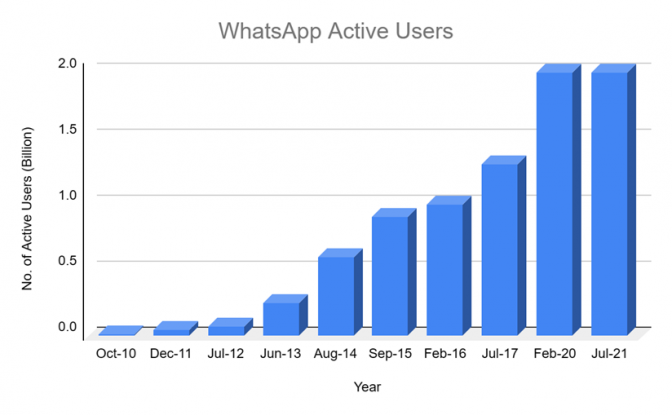WhatsApp amongst other social media platforms is one of the most renowned one. But what you may not know is that it’s also a treasure trove of personal data. From your messages and contacts to your location and online activity, WhatsApp collects a wealth of information about you. And with data breaches and privacy concerns on the rise, it’s important to take a closer look at WhatsApp’s data privacy practices. So let’s dive in, shall we?
What data does WhatsApp collect?

Let’s look at some stats. According to a 2021 study by Statista, WhatsApp has over 2 billion, monthly active users. That’s a whole lot of messages being sent every day to every corner of the world. And every time you send a message on WhatsApp, it’s stored on WhatsApp’s servers. In fact, WhatsApp stores all of your messages until they are delivered to the recipient. And even after they are delivered, the messages are still stored on WhatsApp’s servers for a short period of time.
But it’s not just your messages that WhatsApp is collecting. WhatsApp also collects information about your device, such as your IP address, device type, and operating system. And if you use WhatsApp’s location-sharing feature, it can also collect your precise location data.
How is this data used?
So, why does WhatsApp collect all of this data? According to WhatsApp, it’s to improve the app’s functionality and provide a better user experience. For example, WhatsApp uses your device information to optimize the app’s performance on your specific device. And it uses your location data to provide location-based services, such as finding nearby businesses.
But with all of this data being collected, there are naturally concerned about privacy. In fact, in 2021, WhatsApp was the second-most complained about app in the EU with regards to data protection, according to a report by the European Data Protection Supervisor. And WhatsApp has faced several privacy-related controversies in recent years.
Security and data breach incidents involving WhatsApp
- 2022 WhatsApp Breach: More recently, November 2022 witnessed the sale of 487 million WhatsApp user data by a hacker on a well-known hacking site. It included information on WhatsApp users from 84 different nations with almost 100 million compromised users were just from Egypt, Italy, and the USA.
- 2019 WhatsApp Breach: In May 2019, it was reported that hackers had exploited a vulnerability in WhatsApp to install spyware on users’ phones. The spyware was allegedly developed was used to target journalists, activists, and other high-profile individuals. WhatsApp said that approximately 1,400 users were affected by the breach.
- 2018 WhatsApp Breach: In August 2018, it was reported that hackers had used a flaw in WhatsApp’s voicemail system to install spyware on users’ phones. The spyware was allegedly developed to target human rights activists and journalists. WhatsApp said that it had notified law enforcement about the breach.
- 2017 WhatsApp Encryption Vulnerability: In January 2017, it was reported that WhatsApp’s encryption could be easily bypassed, allowing attackers to read users’ messages. The vulnerability was reportedly due to a flaw in WhatsApp’s implementation of the Signal protocol, which is used to encrypt messages. WhatsApp later fixed the vulnerability.
- 2014 WhatsApp Security Vulnerability: In October 2014, it was reported that WhatsApp’s encryption key generation algorithm had a flaw that made it vulnerable to attacks. The flaw could allow attackers to intercept and read users’ messages. WhatsApp later fixed the vulnerability.
Read More: The Reality Of TikTok Celebrity Culture – About Pakistan
Another controversy was WhatsApp’s decision to update its privacy policy in early 2021, which sparked a backlash from users. The updated policy would have allowed WhatsApp to share more data with its parent company, Facebook, including users’ phone numbers, IP addresses, and transaction data. However, after facing criticism and backlash from users, WhatsApp postponed the implementation of the new policy.
Measures by WhatsApp to Improve its Security
- End-to-End Encryption: In 2016, WhatsApp introduced end-to-end encryption for all messages sent through its platform. This would entail that only the person sending the message and the one who receives, can read its contents, even WhatsApp won’t have access to the message.
- Two-Step Verification: WhatsApp has offered two-step verification since 2017, allowing users to add an extra layer of security to their account by requiring a passcode to be entered before the account can be accessed.
- Security Notifications: WhatsApp regularly sends notifications to users when their security settings have been changed, such as when a new device is linked to their account.
- Report a Contact: WhatsApp allows users to report any suspicious or abusive contact to its customer support team, who will investigate and take appropriate action.
- Bug Bounty Program: WhatsApp offers a bug bounty program to incentivize researchers to report any security vulnerabilities they discover in the platform. This helps WhatsApp identify and fix any potential security issues before they can be exploited by attackers.
- Privacy Settings: WhatsApp offers a range of privacy settings that allow users to control who can see their profile information, status updates, and other personal data.
As a user, to protect your data on WhatsApp? Here are a few tips
Use Two-Step Verification: Two-step verification adds an extra layer of security to your WhatsApp account. When you enable two-step verification, you’ll be asked to enter a six-digit passcode whenever you try to verify your phone number on a new device.
Be Careful What You Share: Avoid sharing sensitive information, such as personal details or financial information, over WhatsApp. And be cautious when sharing your location data with others.
Use Privacy Settings: WhatsApp offers a range of privacy settings that allow you to control who can see your profile information, status updates, and other personal data. Take advantage of these settings to protect your privacy.
Keep Your App Updated: Make sure you always have the latest version of WhatsApp installed on your device, as this will help to ensure that any security vulnerabilities are patched.
Conclusion
In conclusion, WhatsApp collects data about its users to improve the user experience, personalize the app, and protect the safety and security of its users. While this data is collected for legitimate reasons, it is important to be aware of what information is being collected and how it is being used. By understanding what data WhatsApp collects and how it is used, users can make informed decisions about whether to use the app and how to protect their privacy and security while using it.

















